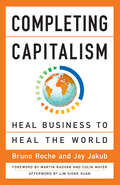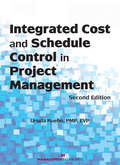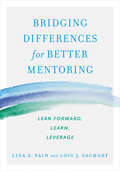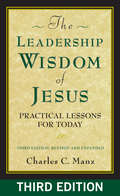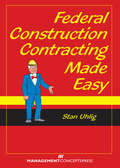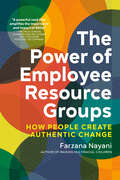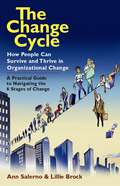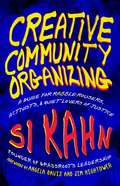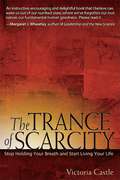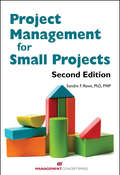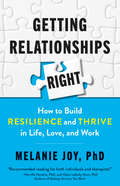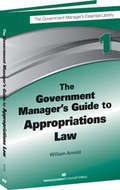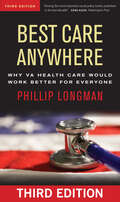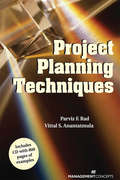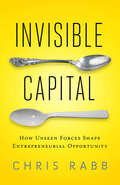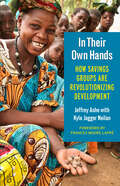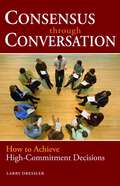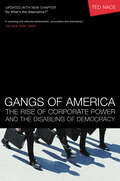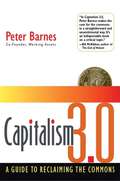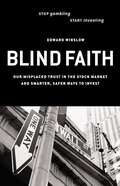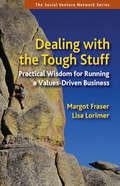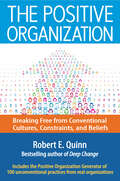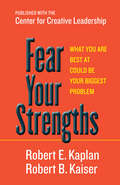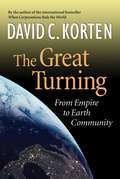- Table View
- List View
Completing Capitalism: Heal Business to Heal the World
by Bruno Roche Jay JakubProven, Profitable, and SustainableFor the past fifty years, leaders in the business world have believed that their sole responsibility is to maximize profit for shareholders. But this obsessive focus was a major cause of the abuses that nearly sunk the global economy in 2008. In this analytically rigorous and eminently practical book, Bruno Roche and Jay Jakub offer a more complete form of capitalism, one that delivers superior financial performance precisely because it mobilizes and generates human, social, and natural capital along with financial capital. They describe how the model has been implemented in live business pilots in Africa, Asia, and elsewhere. Recent high-profile books like Capital in the Twenty-First Century have exposed financial capitalism's shortcomings, but this book goes far beyond by describing a well-developed, field-tested alternative.
Integrated Cost and Schedule Control in Project Management
by Ursula Kuehn PMP, EVPThe Practical, Precise, and Proven Approach to Integrated Cost and Schedule Control!This trusted project management resource, now in its second edition, includes expanded coverage of how integrated cost and schedule control works within the federal government. With the renewed emphasis on transparency in government, the processes detailed in this book are particularly relevant.Building on the solid foundation of the first edition, this updated second edition includes new material on:• Project planning in the federal government• Integrated baseline reviews• Federal requirements for an ANSI/EIA-748 compliant earned value management system• Federal requirements for performance reportsIntegrated Cost and Schedule Control in Project Management, Second Edition, continues to offer a practical approach that is accessible to project managers at all levels. The step-by-step presentation, numerous case studies, and instructive examples give practitioners relevant material they can put to use immediately.
Bridging Differences for Better Mentoring: Lean Forward, Learn, Leverage
by Lois J. Zachary Lisa Z. FainThis first comprehensive guide to helping mentors and mentees bridge gaps between and among cultures—a growing issue in today's diverse workplace—is coauthored by the founder and CEO of the Center for Mentoring Excellence.As the workplace has become more diverse, mentoring has become more challenging. Mentors and mentees may come from very different backgrounds and have limited understanding of each other's cultures and outlooks. But mentoring remains the most powerful tool for creating meaningful relationships, furthering professional development, and increasing engagement and retention. Younger workers and emerging leaders in particular are demanding it. Lisa Z. Fain and Lois J. Zachary offer a timely, evidence-based, practical guide for helping mentors develop the level of cultural competency needed to bridge differences. Firmly rooted in Zachary's well-known four-part mentoring model, the book uses three fictional scenarios featuring three pairs of diverse mentors and mentees to illustrate how key concepts can play out in real life. It offers an array of accessible tools and strategies designed to help you increase your self-awareness and prepare you to embrace and leverage differences in your mentoring relationships. But beyond tips and techniques, Fain and Zachary emphasize that authenticity is the key—the ultimate purpose of this book is to help the mentor and mentee make a genuine connection and learn from each other. That's when the magic really happens.
The Leadership Wisdom of Jesus: Practical Lessons for Today
by Charles C. ManzNEW EDITION, REVISED AND UPDATED In this new edition of the bestselling classic, Charles Manz doesn’t look to Jesus’s teachings to support preconceived theories of how a manager should lead but approaches the New Testament with an open mind to see what insights it reveals for today’s business world. What he finds are powerful lessons that will inspire you—no matter what your religious background—to maintain integrity, live on a higher plane, and ultimately achieve your personal and professional goals. The third edition is updated throughout and includes several new examples and a self-assessment chapter designed to encourage self-examination and personal reflection. Remarkably contemporary and welcoming to all readers, this book will challenge you to evaluate your own leadership style and to consider time-tested spiritual wisdom that can make you more enlightened and more effective.
Federal Construction Contracting Made Easy
by Stan UhligFollow the Path to Success in Federal Construction ContractingOpportunities abound in federal government construction contracting, but the devil is in the details. Companies performing work for the federal government must plan and operate based on very specific guidelines and regulations. Knowing how to work within those strict parameters makes the difference between success and failure.Federal Construction Contracting Made Easy is your road map to successfully identifying, planning, and completing government construction projects. This book guides you in finding opportunities, preparing winning proposals, and staying in compliance on construction projects. It is the one resource you will need to work in this competitive arena. The book provides guidance on:• Understanding the Federal Acquisition Regulation and knowing when and how to use it for your benefit and protection• Preparing quality control and safety programs that comply with federal regulations and processes• Determining when a change order is required and how to price and properly process• Identifying a claim and knowing how to process itFederal Construction Contracting Made Easy is an invaluable resource for construction firms, architect/engineer firms, subcontractors, and vendors that want to do business with the federal government.Plus! A handy glossary of terms is included.Bonus: Federal Construction Contracting Made Easy: A Field Guide to the FAR is available as a supplement for project superintendents.
The Power of Employee Resource Groups: How People Create Authentic Change
by Farzana NayaniThis is the first authoritative book on building employee resource groups (ERGs) to empower underrepresented employees and positively impact diversity, equity, and inclusion (DEI) efforts within organizations and in society at large.In existence for decades, ERGs originated out of affirmative action policies and have evolved into powerful sources of employee activity and engagement. Organizations can leverage ERGs to support business goals, but ERGs can also play a critical role in creating a more inclusive work environment for marginalized individuals. ERGs represent a balance of serving company interests and empowering employees, offering the opportunity for innovative leadership within organizations. This book is a practical guide on how to manage ERGs effectively and how they inspire a deeper connection between employees and companies while helping us progress toward the DEI goals that we aim to accomplish. Participating in an ERG can help professionals of color and other historically excluded groups advance their careers, thereby increasing diverse representation in leadership. Farzana Nayani provides foundational tools for starting ERGs and outlines the five Ps-purpose, people, processes, planning, and priorities-needed to successfully operate them. Unlike other ERG handbooks, this book is people-centric and socially conscious and thoughtfully takes into account the experiences of employees and leaders during current times. It also serves as a deeper call to action around how ERGs can foster authentic change within organizations, creating transformative impact in the surrounding world.
The Change Cycle: How People Can Survive and Thrive in Organizational Change
by Ann Salerno Lillie BrockDealing with organizational change is about getting through the emotion and commotion with minimal damage to your blood pressure, career, relationships, and confidence. In The Change Cycle, Ann Salerno and Lillie Brock help readers cope by explaining the six predictable and sequential stages of change—loss, doubt, discomfort, discovery, understanding, and integration—and offer examples, tools, and success strategies so you can move resourcefully through each stage. Each chapter focuses on a single stage of the Change Cycle, described in a lively, informal style peppered with frequent humor. Utilizing stories and essays about the ways people, departments, and teams have successfully dealt with challenges, Salerno and Brock offer examples, tools, and success strategies so individuals at all levels will know what to expect from themselves and others and will be able to resourcefully move through each stage. Based on the authors’ fifteen years of experience in hundreds of companies and government agencies worldwide and firmly grounded in recent discoveries in social psychology and cognitive neuroscience, The Change Cycle will help readers at all levels take responsibility for how they react and respond in a changing work environment.
Creative Community Organizing: A Guide for Rabble-Rousers, Activists, and Quiet Lovers of Justice
by Si KahnPrivatization has been on the right-wing agenda for years. Health care, schools, Social Security, public lands, the military, prisons-all are considered fair game. Through stories, analysis, impassioned argument-even song lyrics-Si Kahn and Elizabeth Minnich show that corporations are, by their very nature, unable to fulfill effectively what have traditionally been the responsibilities of government. They make a powerful case that the market is not the measure of all things, and that a vital public sector is an indispensable component of a healthy democracy.
The Trance of Scarcity: Stop Holding Your Breath and Start Living Your Life
by Victoria CastleIn her own life and through her work with others, Victoria Castle has repeatedly encountered the tragic theme of "not-enough-ness"--both the "I am not enough" and "There is not enough" varieties--and witnessed how it cripples even the most buoyant and passionate people among us. Castle calls this blight the Trance of Scarcity. It shows up in a hundred personalized versions, but the results are always the same. Instead of expressing our brilliance and creativity, we show the world only the by-products of oppression, isolation, exclusion, and defeat. We spend our time lamenting the way things are, justifying all the reasons they can't be different. In this inspiring and very personal book, Castle shows that there is life on the other side of the Trance -- a life characterized by vitality, fulfillment, and efficacy. She shares specific practices you can use to change your story--to identify and interrupt negative, constraining patterns and replace them with more positive and liberating ones to achieve greater freedom, fulfillment, and satisfaction. With compassion and surprising humor, The Trance of Scarcity will help you embody abundance as your way of being. Once you do, you'll be more inspired and more inspiring, you'll build bridges to replace dead ends, and you'll easily arrive at solutions to issues that once overwhelmed you. Having broken free from the Trance of Scarcity, you'll be able to live a life where ease and plenty emanate from you as naturally as your breath.
How Wealth Rules the World: Saving Our Communities and Freedoms from the Dictatorship of Property
by Ben G. PriceCrackdowns on local democracy are accelerating, as corporate and state interests continue efforts to repress social movements. In this well-timed book, Ben Price presciently reveals structures of power and law that facilitate blatant corporate supremacy in the United States. Price uses his years of experience as a community organizer and a careful reading of history to show how a legal paradigm that facilitated slavery and the fossil fuel economy has endured and adapted over time – today barricading our communities and squelching dissent.Many books have been written about wealth, power and politics in the United States. Most of them make intuitive sense. Wealthy people use their power to influence and control politics. But Ben Price's new book is often counterintuitive as he explores how wealth itself is imbued with power. He answers questions such as:How is the American Legislative Exchange Council – a modern states' rights, free market capitalist group – the intellectual and political descendant of George Washington's Federalist Party?How was the Fourteenth Amendment that emancipated African American slaves from their status as property used by a reactionary Supreme Court to grant legal "personhood" to private corporations?How are cities seen under our legal doctrine as "public corporations," devoid of real governing authority?Further, Price identifies key counterrevolutions in U.S. history that squelched the transformative potential of the Civil War and American Revolution, and traces the roots of colonial and imperial systems of control. He links them to modern "free trade" agreements and other antidemocratic structures used to supersede democracy to this day.For some, this will come as no surprise. For others, it will be a rude, though necessary, awakening. "The white man's municipalities are just reservations, like ours," said a resident of Pine Ridge Reservation, who Price spoke with. "The difference is, we know we live on reservations. The white man doesn't."Crucially, Price shares insight into how social movements can plant seeds of a new legal system that makes the liberty, civil rights and dignity of humans and ecosystems its ultimate purpose. In fact, he introduces the reader to people who are doing just that.
Project Management for Small Projects
by Sandra R. Rowe PhD, PMPImportant New Tools for Managing Your Small Projects As Part of a Larger Program!The first edition of Project Management for Small Projects introduced project management processes, tools, and techniques that are scalable and adaptable to small projects. Project managers learned a structured, disciplined approach to managing small projects sensibly and realistically. This new edition is updated throughout to reflect the PMBOK® Guide, Fifth Edition, balancing the particular needs of small projects with the project management methodology.Project managers who are proficient at managing and leading their own projects are increasingly being called upon to work collaboratively with other project managers to lead components of a program. In addition to knowing how to manage processes and how to lead the team, project managers must now also know how to collaborate and share knowledge with other project managers. A new chapter on program management offers important insights and guidance for managing a group of related small projects in a coordinated way to obtain benefits and control not available from managing them individually.
Getting Relationships Right: How to Build Resilience and Thrive in Life, Love, and Work
by Melanie JoyBestselling author, psychologist, and relationship coach Melanie Joy shares the principles and tools that can make any relationship, from personal to professional, healthier and more resilient.Relationships are complicated. Yet it's an unfortunate reality that while most of us have to learn complex geometry that we'll probably never use, we don't get a single formal lesson in how to relate to others. In this one-stop guide, psychologist Melanie Joy reveals the common psychological dynamics that underlie all kinds of relationships—with a romantic partner, friends, family members, colleagues—in short, with anyone in any situation. Understanding these dynamics will help you make all your relationships healthier and more resilient. Relationships are like bodies: they get sick when their immune system is weaker than the germs that stress them. Drawing on the most relevant research as well as on her own extensive experience as a psychologist, Joy explains how to strengthen your relational immune system to resist not only interpersonal stressors but also largely invisible yet potentially devastating societal stressors like racism and sexism. With this understanding, you can cultivate relationships that consistently reflect core moral values and honor the dignity of everyone involved. Resilient relationships are not only a source of joy and fulfillment for those who are in them, they also support the thriving of the organizations and communities of which we all are a part.
The Government Manager's Guide to Appropriations Law
by William G. Arnold CDFM-AThis guide offers sound and easy-to-apply advice to help government managers deal with appropriated funds properly and legally. It follows the organization of the Redbook, the Government Accountability Office's 2,000+ page Principles of Federal Appropriations Law. Government purchase card holders and approvers will find this book especially helpful in understanding the common risks that arise and how to avoid violating the myriad rules and regulations involved.
Best Care Anywhere: Why VA Health Care Would Work Better For Everyone
by Phillip LongmanNEW EDITION, REVISED AND UPDATED Phillip Longman tells the amazing story of the turnaround of the Department of Veterans Affairs health-care system from a dysfunctional, scandal-prone bureaucracy into the benchmark for high-quality medicine in the United States. Best Care Anywhere shows that vast swaths of what we think we know about health, health care, and medical economics are just plain wrong. And the book demonstrates how this extraordinarily cost-effective model, which has proven to be highly popular with veterans, can be made available to everyone. New to this edition is an analysis of how the shortcomings of both so-called Obamacare and Republican plans to privatize Medicare reinforce the need for applying the lessons of the VA. Also included are completely updated statistics and research, as well as examples of how the private sector is already beginning to learn from the VA’s example.
Project Planning Techniques Book
by Parviz F. Rad Vittal S. AnantatmulaA Comprehensive Framework for Project Planning in Any Industry!Project Planning Techniques is a comprehensive reference for project managers in any discipline, outlining the latest proven-effective methods based on solid research. Blending practical experience with academic rigor, this authoritative resource will help you develop a deeper understanding of current knowledge and best practice techniques for project success.With practical examples from many industries, Project Planning Techniques gives you a firm understanding of how these methods are applied in real-world situations.• Get a solid foundation in project planning fundamentals• Discover the latest indices and models for project selection and prioritization• Gain an understanding of the schedule network and the project schedule• Learn processes and techniques for monitoring expenditures during the implementation phase• Explore the relationship between knowledge management and project management - and how you can manage project knowledge by integrating techniques from both systemsFrom start to finish, Project Planning Techniques will help you improve your understanding of project planning — and your performance as a project leader.Bonus CD-ROM: Project Planning Techniques includes a bonus CD-ROM with comprehensive examples from several industries, including WBS, RBS, network diagrams, project estimates, and much more.
Invisible Capital: How Unseen Forces Shape Entrepreneurial Opportunity
by Chris RabbWriter, consultant and speaker Chris Rabb coined the term "invisible capital" to represent the unseen forces that dramatically impact entrepreneurial viability when a good attitude, a great idea, and hard work simply aren't enough. In his book, Invisible Capital: How Unseen Forces Shape Entrepreneurial Opportunity, Rabb puts forth concrete and effective ways entrepreneurs and their advocates can build and grow sustainable enterprises amid these unseen forces created by society's uneven playing field. By honoring democratic ideals, challenging assumptions, and reframing how success is defined, Rabb illuminates the promise of commonwealth entrepreneurship. This compelling and often counter-intuitive book illustrates how broad and meaningful entrepreneurial opportunity benefits not just individual entrepreneurs, but local communities and society at large.
In Their Own Hands: How Savings Groups Are Revolutionizing Development
by Kyla Jagger Neilan Jeffrey AsheTwo and a half billion people worldwide, most of them desperately poor villagers, need a better way to save and to borrow. Even the most innovative banking institutions can&’t reach them; savings groups can. In savings groups, members save what they can in a communal pot and loan their growing fund to each other for their short-term needs. Jeffrey Ashe and Kyla Neilan illustrate how these savings groups form and function and how little &“outside&” support is actually required for their success. Drawing on decades of Ashe&’s personal experience, this book describes how he developed Saving for Change, which leveraged the wisdom and strength of group members to train and establish new groups. This model has impacted the lives of 680,000 people across five countries. Savings groups are a &“catalytic innovation&” that bypasses subsidies, dependency, and high costs while effectively reducing chronic hunger, building assets, and empowering the community. Today, saving groups have 9 million members around the globe—with minimal support, membership could grow to ten times this number.
Consensus Through Conversations: How to Achieve High-Commitment Decisions
by Larry DresslerReal organizational change isn't brought about by decree, pressure, permission, or even persuasion. Sustained change comes when people are passionately and personally committed to a future that they have helped to shape. If you want to turn your organization's cynics into owners, give them a voice in the decisions that impact their work. Consensus Through Conversation shows how. Consensus is a cooperative process in which all of a group's members develop and agree to actively support a decision. It's not mere acquiescence--consensus goes several steps beyond, transforming people from resigned instruction-followers to dedicated champions of an idea. Larry Dressler shows you exactly how to prepare for a successful consensus-building process, takes you step-by-step through that process, and offers tips for success and traps to avoid. Throughout, he provides a host of tools and examples that make this an eminently practical and immediately useful guide. Consensus Through Conversation will give you the tools you need to use consensus effectively in your organization. It is a handy, vital reference that you will turn to again and again in your efforts to tackle high stakes issues, make high quality decisions, and build enthusiasm and commitment to action.
Gangs of America: The Rise of Corporate Power and the Disabling of Democracy
by Ted NaceThe corporation has become the core institution of the modern world. Designed to seek profit and power, it has pursued both with endless tenacity, steadily bending the framework of law and even challenging the sovereign status of the state. Where did the corporation come from? How did it get so much power? What is its ultimate trajectory? After he sold his successful computer book publishing business to a large corporation, Ted Nace felt increasingly driven to find answers to these questions. In Gangs of America he details the rise of corporate power in America through a series of fascinating stories, each organized around a different facet of the central question: "How did corporations get more rights than people?" Beginning with the origin of the corporation in medieval Great Britain, Nace traces both the events that shaped the evolution of corporate power and the colorful personalities who played major roles. Gangs of America is a uniquely accessible synthesis of the latest scholarly research, a compelling historical narrative, and a distinctive personal voice.
Capitalism 3.0: A Guide to Reclaiming the Commons
by Peter BarnesThe commons — those creations of nature and society we inherit together and must preserve for our children — is under siege. Our current version of capitalism — the corporate, globalized version 2.0 — is rapidly squandering this heritage. Now, Peter Barnes offers a solution: protect the commons by giving it property rights and strong institutional managers. Barnes shows how capitalism — like a computer — is run by an operating system. Our current operating system gives too much power to profit-maximizing corporations that devour the commons and distribute most of their profits to a sliver of the population. And government — which in theory should defend the commons — is all too often a tool of those very corporations. Barnes proposes a revised operating system — Capitalism 3.0 — that protects the commons while preserving the many strengths of capitalism as we know it. His major innovation is the commons trust, a market based legal entity with the power to limit the use of scare commons, charge rent, and pay dividends — in both cash and services — to everyone. In Barnes' vision, an array of commons trusts would institutionalize our obligations to future generations, fellow citizens, and nature. Once established, they'd use markets and property rights to create a better world for us all. Capitalism 3.0 offers a practical alternative to our current flawed economic system. It points the way to a future in which we can retain capitalism's virtues while mitigating its vices.
Blind Faith: Our Misplaced Trust in the Stock Market--And Smarter, Safer Ways to Invest
by Edward WinslowThe risk of investing in the stock market has increased remarkably over the last decade. In this period we've seen tremendous volatility in stock prices, a market bubble and its subsequent pop, a parade of corporate scandals, the demise of a leading accounting firm and proven deception by many so-called investment analysts employed by major brokerage firms. In addition, the realities of ever-increasing geopolitical risks contribute to an uncertain economic future. Blind Faith offers a cleverly simple yet revolutionary approach for managing investments in this perpetual high-risk environment. Corporate America and the investment industry have little to gain and lots to lose when investors decide to stop playing the traditional game that can -and has - destroyed trillions of dollars of individual wealth overnight. Readers will be equipped with both the strategy and the tools for success in virtually any economic environment while ending their participation in a system that has taken full advantage of their blind faith and misplaced trust.
Dealing With the Tough Stuff: Practical Wisdom for Running a Values-Driven Business
by Lisa Lorimer Margot FraserYour business plan is only going to get you so far. When you’re actually running a values-driven business problems come up that you never could have anticipated. And as a mission-driven organization you face issues your more conventional colleagues never have to grapple with. The whole experience can be incredibly isolating and draining. Margot Fraser and Lisa Lorimer have been there, and they’re here to help. Together with five of their colleagues—including Stonyfield Yogurt founder Gary Hirshberg and former Ms. Foundation president Marie C. Wilson—they offer the kinds of personal insights and seasoned advice you just can’t get in business school. It’s like having a coaching session with some of the nation’s top socially conscious entrepreneurs. Each chapter of Dealing with the Tough Stuff tackles a particular challenge. How open and honest can you really be with your employees and still run an efficient business? At what point do you seek outside expertise? What do you do when things go terribly wrong? When is it time to leave? The authors and the members of their “advisory board” share their experiences—not just what worked, but sometimes what spectacularly didn’t. Some of these stories are harrowing: a worker getting killed by factory equipment, a supplier embezzling funds, a false accusation of intellectual property theft. Others are simply day-to-day conundrums: meeting payroll when you’re always in debt, deciding when and how to expand in a responsible way, balancing business needs with your commitment to the triple bottom line. At the end of each chapter, Lorimer and Frasier draw on the stories to offer practical "survival suggestions" that can guide readers through similar situations. This is a book that readers can look to for affirmation, hope and tools. Others have been through what you’re going through, if not worse. They made it and so can you—because they’re going to show you how they did it. No book can cover every challenge that might arise, but if you learn from the attitudes, techniques and coping mechanisms these seasoned leaders offer, you’ll get through the tough stuff with your sanity and your business intact.
The Positive Organization: Breaking Free from Conventional Cultures, Constraints, and Beliefs
by Robert E. QuinnBeholden to accepted assumptions about people and organizations, too many enterprises waste human potential. Robert Quinn shows how to defy convention and create organizations where people feel fully engaged and continually rewarded, where both individually and collectively they flourish and exceed expectations.The problem is that leaders are following a negative and constraining "mental map" that insists organizations must be rigid, top-down hierarchies and that the people in them are driven mainly by self-interest and fear. But leaders can adopt a different mental map, one where organizations are networks of fluid, evolving relationships and where people are motivated by a desire to grow, learn, and serve a larger goal. Using dozens of memorable stories, Quinn describes specific actions leaders can take to facilitate the emergence of this organizational culture—helping people gain a sense of purpose, engage in authentic conversations, see new possibilities, and sacrifice for the common good. The book includes the Positive Organization Generator, a tool that provides 100 real-life practices from positive organizations and helps you reinvent them to fit your specific needs. With the POG you can identify and implement the practices that will have the greatest impact on your organization. At its heart, the book helps leaders to see new possibilities that lie within the acknowledged realities of organizational life. It provides five keys for learning to be "bilingual"--speaking the conventional language of business as well as the language of the positive organization. When leaders can do this, they are able to make real and lasting change.
Fear Your Strengths: What You Are Best at Could Be Your Biggest Problem
by Robert E. Kaplan Robert B. KaiserOnce you’ve discovered your strengths, you need to discover something else: your strengths can work against you. Many leaders know this on some intuitive level, and they see it in others. But they don’t see it as clearly in themselves. Mainly, they think of leadership development as working on their weaknesses. No wonder. The tools used to assess managers are not equipped to pick up on overplayed strengths—when more is not better. Nationally recognized leadership experts Bob Kaplan and Rob Kaiser have conducted thousands of assessments of senior executives designed to determine when their strengths serve them well—versus betray them. In this groundbreaking book, they draw on their data and practical experience to identify four fundamental leadership qualities, each positive in and of itself but each of which, if overemphasized, can seriously compromise your effectiveness. Most leaders, they’ve found, are “lopsided”—they favor certain qualities to the exclusion of others without realizing it. The trick is to keep all four in balance. Fear Your Strengths provides tools to help you become aware of your leadership leanings and excesses and provides insights for combatting the mindset that encourages them. It offers a practical psychology of leadership, a better way for leaders to calibrate their performance so that you can make sure your strengths don’t overpower you but rather move you—and your organization—forward.
The Great Turning: From Empire to Earth Community (Bk. Currents Ser.)
by David C. KortenDavid Korten’s classic bestseller When Corporations Rule the World was one of the first books to articulate the destructive and oppressive nature of the global corporate economy. In The Great Turning he argues that corporate consolidation of power is merely one manifestation of what he calls “Empire”: the organization of society through hierarchy and violence that has largely held sway for the past 5,000 years. The Great Turning traces the evolution of Empire from ancient times to the present day but also tells the parallel story of the attempt to develop a democratic alternative to Empire, beginning in Athens and continuing with the founding of the United States of America—although elitists with an imperial agenda have consistently sought to undermine the bold and inspiring “American experiment.” Finally, Korten draws on evidence from sources as varied as evolutionary theory, developmental psychology, and religious teachings to make the case that “Earth Community”—a life-centered, egalitarian, sustainable alternative to Empire based on democratic principles of partnership—is indeed possible. And he outlines a grassroots strategy for beginning the momentous turning toward a future of as-yet-unrealized human potential.
